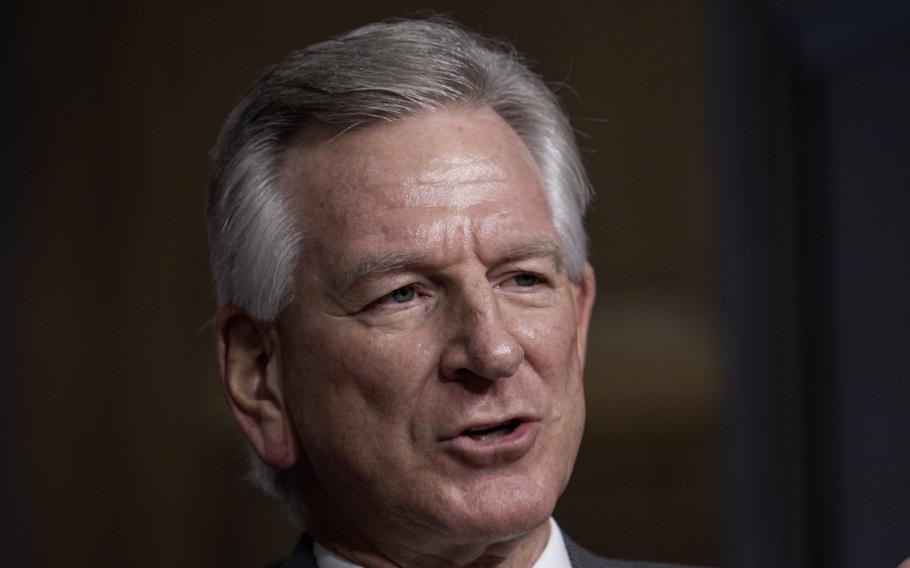
Sen. Tommy Tuberville, R-Ala., attends a Senate Armed Services Committee hearing on Capitol Hill in Washington on Tuesday, July 11, 2023. (Carlos Bongioanni/Stars and Stripes)
Defense Secretary Lloyd Austin on Tuesday told reporters that he expects America’s enemies were pleased with the procedural block on top military promotions orchestrated by Sen. Tommy Tuberville in protest of a Pentagon policy that covers travel costs for abortions.
Austin implored the Alabama Republican to drop his hold on a procedural vote to confirm more than 260 general and admiral promotions, telling reporters in a Pentagon news conference that it had become a combat “readiness issue.” The defense secretary also defended his policy, which allows the Pentagon to reimburse service members for out-of-state travel expenses for certain reproductive health care, including abortions, which have been banned in some parts of the United States.
“The fact that Sen. Tuberville maintains this hold on our senior officers — it cascades and it creates friction through the entire chain [of command.] It disadvantages families,” Austin told reporters during a briefing that followed a meeting on efforts to bolster Ukraine in its ongoing fight against invading Russian forces. “And, so I would ask Sen. Tuberville to lift this hold, and if you think about it, I would imagine our adversaries would look at something like this and be pretty happy that that we create this kind of turbulence [and] put that on our force."
Tuberville has repeatedly maintained Austin’s policy is illegal because it violates the Hyde Amendment, which bans any federal funding for abortions. A spokesman for Tuberville declined comment Tuesday.
Austin and Tuberville spoke by phone about the issue on July 13, but the pair reached no consensus on the issue, according to the Pentagon.
Austin on Tuesday defended his policy as legal and backed by the Justice Department because it only pays travel expenses and permits troops to use their leave to seek medical care. He said the Pentagon owed its troops the opportunity to make health care choices for their families, including seeking abortions or other procedures such as in vitro fertilization.
One in five U.S. troops are women, Austin said. Thousands of those women — and the female spouses of service members — are stationed in states that have essentially banned abortion access since the Supreme Court last year repealed abortion protections formerly granted by the Roe v. Wade decision.
“They don't get a chance to pick where they’re assigned,” Austin said. “They're serving their country, they're sacrificing each and every day, and they deserve, in my view [and] in the view of our leadership, they deserve to have access to non-covered reproductive health care. And that's what this policy does.”
Austin’s comments come one day after White House officials labeled the issue a potential barrier to retaining troops, especially those stationed in states with abortion bans.
"What happens if you get assigned to a state like Alabama, which has a pretty restrictive abortion law in place, and you're concerned about your reproductive care?” said retired Rear Adm. John Kirby, the spokesman for the National Security Council. “What do you do? Do you say no and get out? Well, some people may decide to do that, and what does that mean? That means we lose talent, important talent.”
Tuberville has repeatedly defended his action, which holds the Senate from simultaneously confirming large numbers of military promotions in a single voice vote. He has maintained the Senate can still confirm military leaders nominated for promotion one at a time. Democrats, however, have rejected that idea, saying it would eat up months of Senate business time.
The Republican-led House last week passed a version of the fiscal 2024 National Defense Authorization Act, the annual must-pass bill that sets Pentagon spending and policy priorities, with a provision to repeal Austin’s policy on travel reimbursement for abortions or other reproductive medical care. The Senate version of the bill was still in the works, but the Democrat-led upper chamber was not expected to back such a repeal.
Pentagon officials have projected Tuberville’s hold will impact more than 650 general and admiral nominations by the end of the year. The block has already left the Marine Corps without a confirmed commandant for the first time in more than century. In the coming months, the Army’s chief of staff, Gen. James McConville, and the chairman of the Joint Chiefs of Staff, Army Gen. Mark Milley, are set to retire, potentially leaving those jobs void of a confirmed officer. The Navy’s top officer, Adm. Mike Gilday, is expected to retire before the end of the year, as well.
President Joe Biden has nominated Air Force Gen. Charles “CQ” Brown, the Air Force chief of staff, to replace Milley, who must retire by October by law.